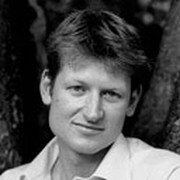
Mark Lynas
Lynas's book walks readers through the hellish scenario implied by a warming planet, degree by degree. A single degree hotter, he shows, will bring severe droughts; two will see the US population fleeing a desiccated land, and so on. Beyond six degrees, which he explains may see huge fireballs crashing into cities, the story finishes, along with most of humanity. Drawing on a vast amount of research, Lynas's book tempers its pessimism by insisting that time remains for the world to avert the coming crisis.
Speaking after the ceremony at the Royal Society, Lynas said he was delighted with his prize, "not least because the bookmaker William Hill judged my book the least likely to win.
"It's not just an accolade for me," he added, "but also for the work of the climate scientists on whose shoulders my writing rests. The book is for a popular audience, and of course it hasn't been peer-reviewed, so to get this accolade from one of the most distinguished scientific bodies in the world means a lot."
The book saw off strong competition from shortlisted authors including the 1994 winner Steve Jones for Coral, J Craig Venter for A Life Decoded and Ian Stewart for Why Beauty is Truth. Chair of the judges professor Jonathan Ashmore said: "Six degrees is not just a great read, written in an original way, but also provides a good overview of the latest science on this highly topical issue. This is a book that will stimulate debate and that will, Lynas hopes, move us to action in the hope that this is a disaster movie that never happens. Everyone should read this book."
The scientific outlook was rather brighter for the Society's parallel Junior Prize, also awarded last night. Magic monster heads, oozing slime and a soap powered fish are some of the subjects of the Big Book of Science Things to Make and Do, which won the £10,000 award for Rebecca Gilpin, Leonie Pratt and illustrator Josephine Thompson.
The prize is a genuine indication of appeal to children, since the shortlist of six is voted on by panels of "junior judges" in 120 schools. Eleven-year-old Frankie, one of the judges, said: "This book is ace, we made the helicopters straight away, all the activities look fun and are dead easy to do, I would like to own this book." The judges on the main prize panel were Professor Jonathon Ashmore, Department of Physiology, University College London; Dr Brian Cox, Royal Society University Research Fellow, University of Manchester and CERN; Fiona Macrae, science correspondent, the Daily Mail; Professor Iain Stewart, School of Earth, Ocean and Environmental Sciences, University of Plymouth. Representing the non-specialist readers was Ffion Hague, who has previously been an Orange prize judge.
Speaking after the ceremony at the Royal Society, Lynas said he was delighted with his prize, "not least because the bookmaker William Hill judged my book the least likely to win.
"It's not just an accolade for me," he added, "but also for the work of the climate scientists on whose shoulders my writing rests. The book is for a popular audience, and of course it hasn't been peer-reviewed, so to get this accolade from one of the most distinguished scientific bodies in the world means a lot."
The book saw off strong competition from shortlisted authors including the 1994 winner Steve Jones for Coral, J Craig Venter for A Life Decoded and Ian Stewart for Why Beauty is Truth. Chair of the judges professor Jonathan Ashmore said: "Six degrees is not just a great read, written in an original way, but also provides a good overview of the latest science on this highly topical issue. This is a book that will stimulate debate and that will, Lynas hopes, move us to action in the hope that this is a disaster movie that never happens. Everyone should read this book."
The scientific outlook was rather brighter for the Society's parallel Junior Prize, also awarded last night. Magic monster heads, oozing slime and a soap powered fish are some of the subjects of the Big Book of Science Things to Make and Do, which won the £10,000 award for Rebecca Gilpin, Leonie Pratt and illustrator Josephine Thompson.
The prize is a genuine indication of appeal to children, since the shortlist of six is voted on by panels of "junior judges" in 120 schools. Eleven-year-old Frankie, one of the judges, said: "This book is ace, we made the helicopters straight away, all the activities look fun and are dead easy to do, I would like to own this book." The judges on the main prize panel were Professor Jonathon Ashmore, Department of Physiology, University College London; Dr Brian Cox, Royal Society University Research Fellow, University of Manchester and CERN; Fiona Macrae, science correspondent, the Daily Mail; Professor Iain Stewart, School of Earth, Ocean and Environmental Sciences, University of Plymouth. Representing the non-specialist readers was Ffion Hague, who has previously been an Orange prize judge.









 Home
Home Politics
Politics









